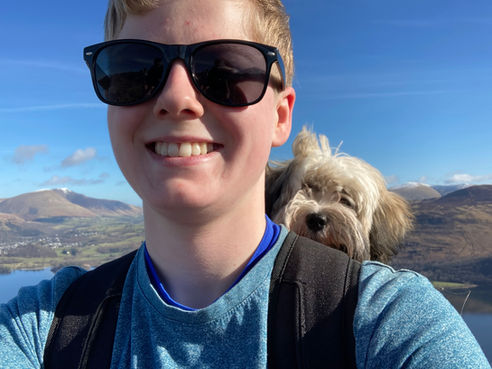

Pippa Hiles
When I first started ticcing, it came on all of a sudden. During August 2021, I went from having an involuntary shoulder jerk to experiencing coprolalia (swearing tics) within just a few weeks.
My Story
I’m also autistic and had already gone through trauma at school the year before. My school decided I didn’t need any support for my autism, so I was left for 18 months to have meltdowns alone in empty classrooms and corridors, completely unsupervised. I was isolated for a long time—especially with the added impact of COVID. My mental health declined severely, and I was really struggling.
When I was later diagnosed with functional tics, it was confirmed that they had been caused by the trauma my school had inflicted. But when I returned after the summer holidays, now visibly ticcing, my school still didn’t offer support. Teachers and classmates weren’t informed about my tics, so people misunderstood, made rude comments, and I felt deeply embarrassed.
In January 2022, I was diagnosed with functional tics, but no one clearly explained that this diagnosis actually meant I had FND (Functional Neurological Disorder). At the time, our own research gave mixed results. Some sources said I had FND, others said I didn’t—since I only had one neurological symptom then. That lack of clarity made things incredibly difficult for years.
It wasn’t until more recently, when my FND worsened and I developed additional neurological symptoms, that things began to make more sense. I also became involved in FND advocacy, which gave me a sense of community and a chance to learn from others going through similar experiences. Before, it had been incredibly hard to find that kind of connection just using the label “functional tics,” but seeing things from an overall “FND” perspective has been so much better.
When I first received the diagnosis, I felt a glimmer of hope—that maybe things would finally start to work out. But unfortunately, they didn’t. Because of the long and controversial history around “functional” health conditions, many people still didn’t believe me. I was accused of faking it. And because FND is such a misunderstood and seemingly rare condition, there wasn’t much support or information available for us.
I was repeatedly told that if I lowered my anxiety and did enough therapy, my tics would eventually go away. Instead, they got worse. I continued to receive limited support from school, which only made things more difficult. But somehow, I made it through. I completed my GCSEs, and after even more trauma, my A-levels—thanks to some supportive school staff, good friends, and close family who did their absolute best to help me.
As my FND progressed, I developed dystonia, speech impairments, memory issues, decreased processing, paralysis, and seizures. All of these are functional neurological symptoms. Even though I’m autistic, I’m considered high-masking and low-support needs. But now, it’s FND that disables me most in daily life. Yet it remains nearly impossible to receive proper support for it. And within the medical field, general understanding of FND is next to non-existent.
That, of course, is infuriating—and it’s exactly why I’m working to change things.
I now attend a SEND (Special Educational Needs and Disabilities) alternative provision college, where I’m studying SEND law. I also work part-time as a SEND teaching assistant and, most importantly, I’m learning how to thrive instead of just survive.
Since the age of 13—just after my autism diagnosis—I’ve been involved in advocacy for young people with SEND. I’ve done public speaking, created educational videos, delivered presentations, and simply shared my story. Often, the biggest impact I’ve had is on those immediately around me and their understanding of these issues. That understanding spreads and improves other people’s lives too.
Since developing tics, I’ve continued this work and even expanded it. I now work with my local authority to advocate for young people with SEND. I collaborate with teams of passionate, dedicated young people and work alongside charities. I also deliver training sessions for educational professionals about SEND, autism, tics, FND, and trauma within schools.
One day, I hope this public speaking and advocacy will become my full-time job.
In my speeches, I mix storytelling from my own experiences with hard-hitting truths. It helps professionals gain insight into someone else’s world—and understand what they could be doing differently. Small changes can create huge differences. And while I do “love” to make people cry over stories about chicken nuggets on smelly school minibuses, I also love to make them laugh. I embrace my tics—no matter how ridiculous they are—and use humour to ease tension and help my message stick.
Hopefully, as more of us continue this work, the lives of those in the FND community will continue to improve. There will be more understanding, more support, and a stronger sense of community for us all.





